Large Majority of Jewish Israelis: Israel Making Substantial Efforts to Avoid Palestinian Suffering; Majority of Arab Israelis Disagree
78% of Jewish Israelis and 22.5% of Arab Israelis think that, given the circumstances of the fighting in Gaza, Israel is making efforts to avoid causing suffering to the Palestinian population there. Nearly half of the Israeli public thinks that the security forces and enforcement agencies are too lenient in their responses to violence by groups of settlers against both the IDF and Palestinians.
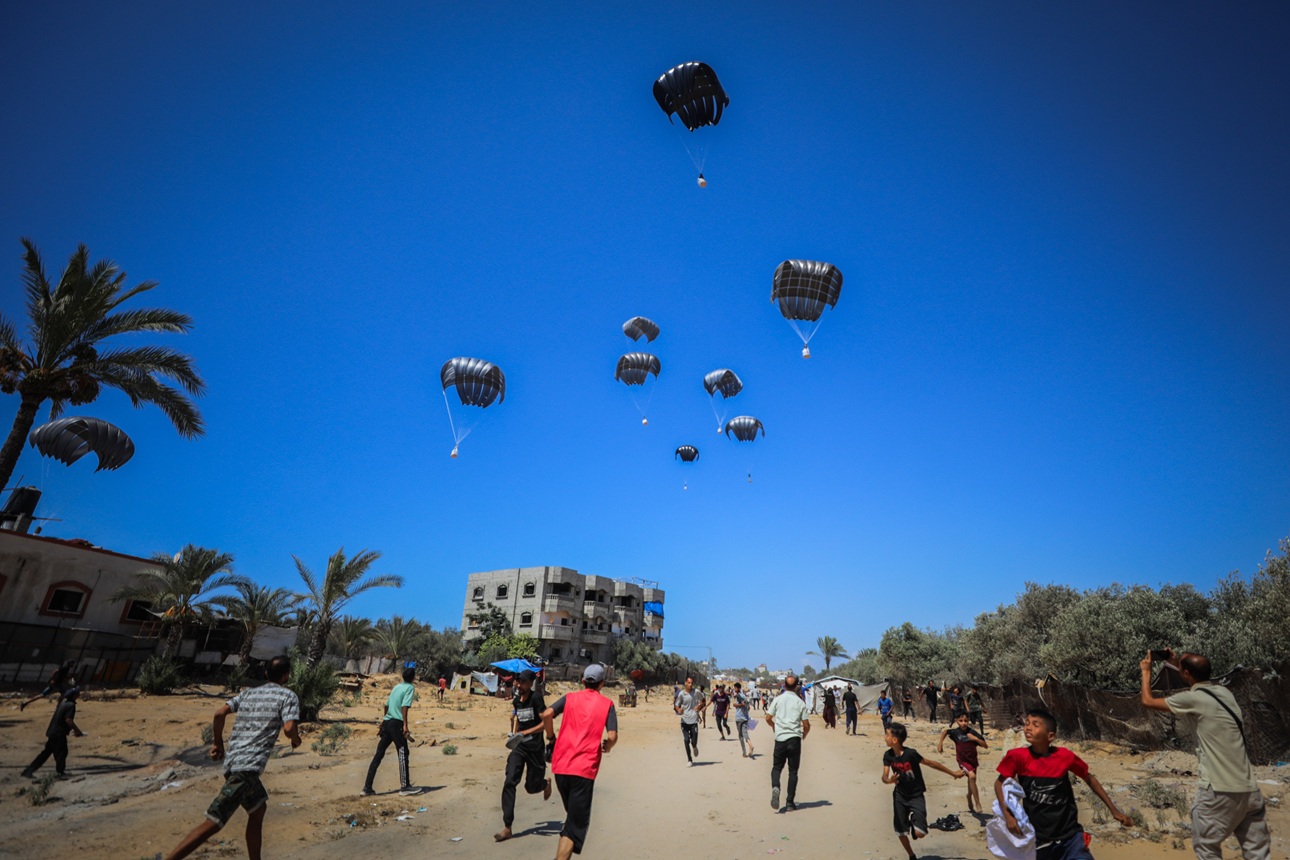
Photo by Ali Hassan/Flash90
Methodology
The survey was conducted by the Viterbi Family Center for Public Opinion and Policy Research at the Israel Democracy Institute between July 27–31, 2025. It was based on a representative sample of the population in Israel aged 18 and above, comprising 601 Jewish interviewees and 152 Arab interviewees.
Main Findings
- Relative to June, we found a decline in optimism this month across all four indicators of the national mood, essentially representing a return to the levels of the previous months. In all four categories (the future of national security, the future of democratic rule, the future of the economy, and the future of social cohesion), only a minority of Israelis are optimistic.
- The majority of Jewish respondents think that, given the circumstances of the fighting in Gaza, Israel is making efforts to avoid causing suffering to the Palestinian population there. The majority of Arab respondents think that even with the restrictions imposed by the fighting, Israel could have done more to reduce this suffering. Among Jews, only on the Left is there a majority who think that Israel is not making the necessary efforts to reduce suffering.
- On a personal level, the majority in the Center and on the Right (Jewish respondents) say that they are not troubled by the reports of famine and suffering among the Palestinian population in Gaza. On the Left, the majority reported that they are personally troubled by these reports.
- The majority of the Jewish public believes the IDF’s reporting on the extent of Palestinian civilian casualties in Gaza, while the majority of the Arab public does not believe its reports. A breakdown of the Jewish sample shows that only on the Left do less than half of the respondents believe the IDF’s reporting, while in the Center and on the Right, the majority consider these reports to be credible.
- The majority of Jewish respondents believe the IDF’s reporting on the number of soldiers who commit suicide during their military service, while more than half of Arab respondents do not believe these reports.
- Nearly half of the Israeli public thinks that the security forces and enforcement agencies are too lenient in their responses to violence by groups of settlers against the IDF, while only around a quarter think they are too harsh. Among voters for the coalition parties, the majority think that the enforcement agencies’ response is too harsh, with the exception of Likud voters, among whom the largest share thinks that these agencies are acting appropriately.
- Regarding violence by groups of settlers against Palestinians in the West Bank / Judea and Samaria, the findings are remarkably similar to those for the previous question—the largest share of respondents think that the authorities are acting too leniently, while around a quarter take the opposite view.
- In light of the “covenant of blood” between Jews and Druze, around half of both the Jewish respondents and the Druze respondents think that the Israeli response in defense of the Druze in Syria was appropriate, while around a quarter think it was too small.
- A large majority of Jews and Druze think that Israel’s military response was correct, despite the positive diplomatic interactions between Israel and Syria, a view taken by only a quarter of (non-Druze) Arab respondents.
- More than half of the public say that the rise in antisemitism and harassment of Israelis abroad is affecting their travel plans in some way or another. Excluding from the calculation those who had no plans to travel abroad in any case, this proportion jumps to three-quarters among Jews and around two-thirds among Arabs.
Relative to the previous month, we found a decline in optimism this month across all four indicators of the national mood, with the sharpest declines those regarding the future of security and the future of democracy, the two subjects which have had the highest rates of optimism over the years. However, as the figure below shows, this does not constitute a new crisis, as these declines have essentially restored the situation that existed two and three months ago; thus, it is possible that the previous month’s finding was anomalous. The relative standing of the four indicators remains the same, even in light of the fact that, for example, the economic situation in Israel is reasonable or better—demonstrating that, as indicated by the heading of this section, the responses are apparently more to do with a general dismal mood than with factual assessments of the situation.
Optimistic about the future of democratic rule, the future of national security, the future of the economy, and the future of social cohesion (total sample; %)
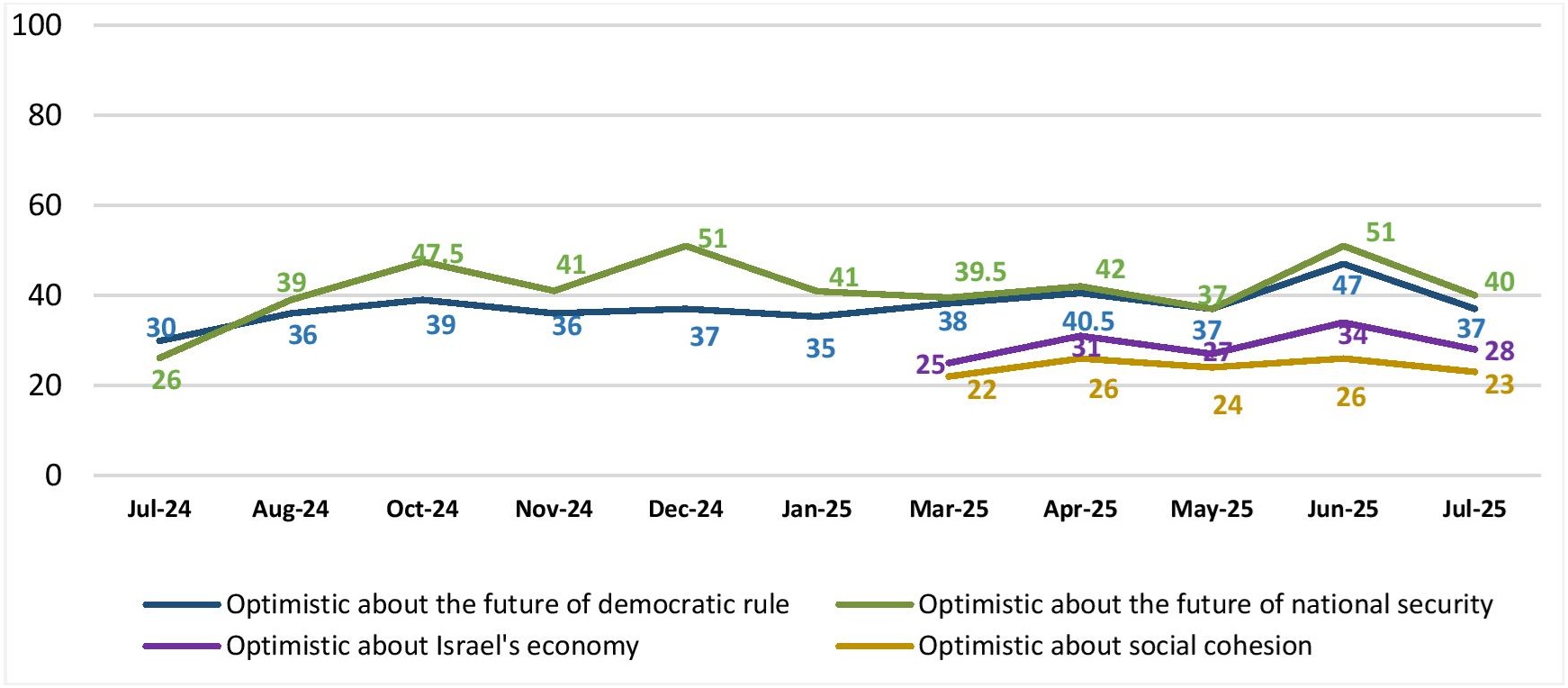
As in previous months, the share of optimists in the Jewish public is greater than the share of optimists in the Arab public. Breaking down responses in the Jewish sample by political orientation reveals that, as in the past, the lowest rate of optimism is found on the Left and the highest on the Right, with the Center somewhere in between.
Optimistic about the future (Jews, %)
The extent of Israel’s efforts to prevent suffering: This month, we focused mainly on the Israeli public’s attitude toward Palestinian suffering, in light of reports and photographs supporting claims of a humanitarian catastrophe in Gaza, and in particular, of severe famine. We asked the respondents which claim they think is more correct: that Israel’s actions are restricted by the fighting, but it is making substantial efforts to avoid causing unnecessary suffering to Palestinians in Gaza; or that even with the restrictions imposed by the fighting, Israel could significantly reduce the suffering of Palestinians in Gaza, but chooses not to. Jews and Arabs have opposite views on this issue: Among Jews, the majority think that the first claim is more correct, while among Arabs, the majority think the second claim is more correct.
Which of the following claims is more correct? (%)
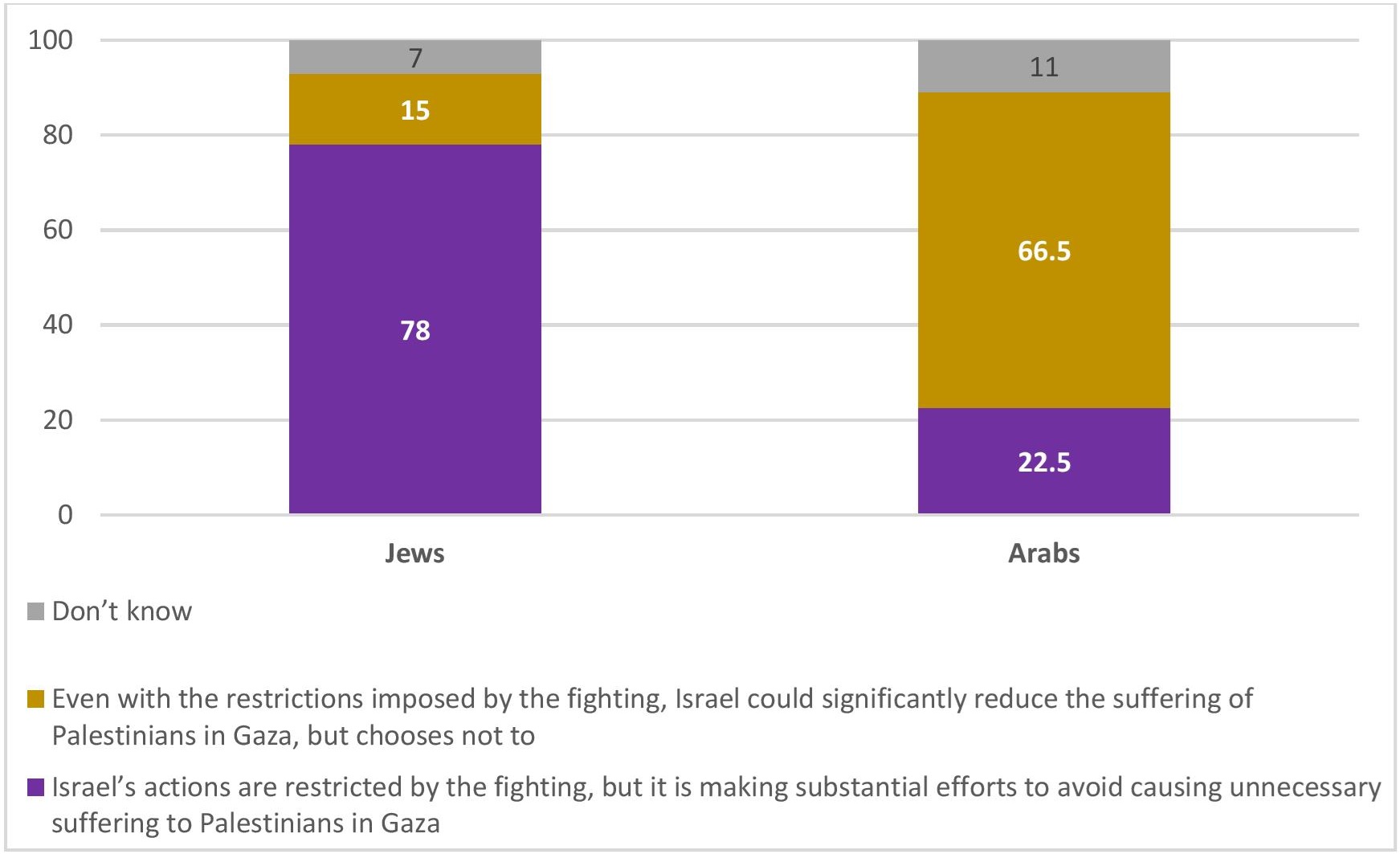
The views of the three political camps (Jews) on this issue are different: The majority of those on the Left think that Israel could have significantly reduced the suffering of the Palestinians in Gaza, whereas in the Center and on the Right, the majority think that given the circumstances of military action, Israel has made considerable efforts in this regard.
Which of the following claims is more correct? (Jews; %)
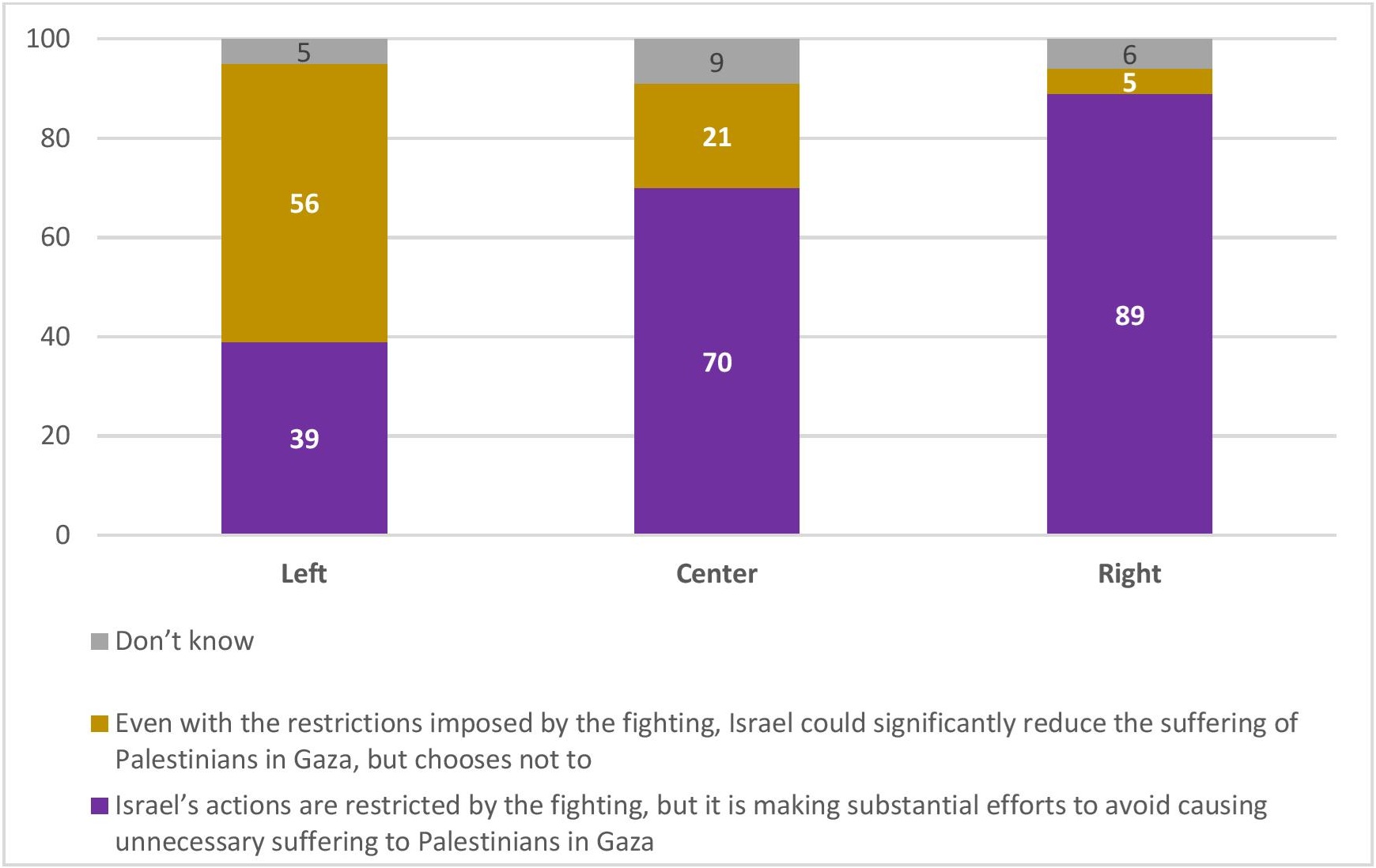
Personal response to the reports from Gaza: From examining the conduct of the state, we moved to a more personal question, asking: “To what extent are you personally troubled or not troubled by the reports of famine and suffering among the Palestinian population in Gaza?” A very large majority of Jewish respondents reported that they are not so troubled or not at all troubled personally by events in Gaza (79%), while the majority of Arabs said that they are very troubled or somewhat troubled (86%).
In the Jewish sample, we found no difference by gender (with 80% of women and 78% of men not troubled), while in the Arab sample we found that women are more troubled than men by the situation in Gaza (women, 92%; men, 80%).
On this question as well, we found a much greater degree of concern on the Left for the suffering and hunger in Gaza than in the Center and on the Right.
Personally troubled by the reports of famine and suffering among the Palestinian population in Gaza (Jews; %)
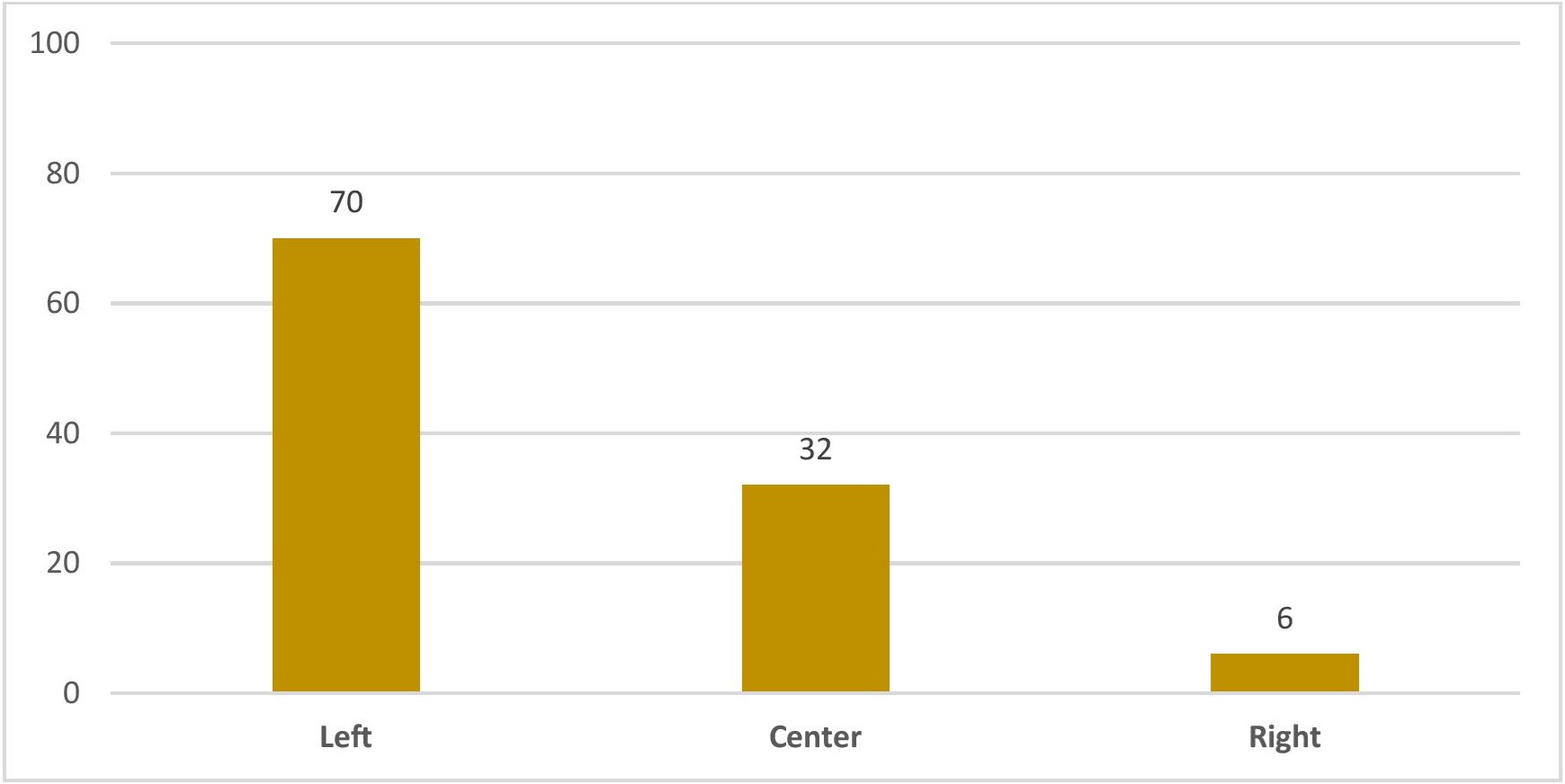
Credibility of the IDF’s reporting on the number of Palestinian civilian casualties in Gaza: A clear majority (70%) of the Jewish public believes the IDF’s reporting on the number of Palestinian civilian casualties in Gaza. By contrast, the majority of the Arab public does not believe these reports (63%).
To what extent do you believe the IDF’s reporting on the extent of Palestinian civilian casualties in Gaza? (%)
Belief in the IDF’s reporting on the extent of casualties in Gaza is also influenced by political position (Jews). Thus, on the Left, less than half (48.5%) believe these reports to a very large or fairly large extent, compared to a majority of respondents in the Center (70%) and on the Right (74%). Breaking down the Jewish sample by religiosity, the largest share of believers in IDF reports is found among the national religious public (86%), while the smallest share is among the Haredim (55%). The other groups are somewhere in between (traditional religious, 80%; traditional non-religious, 76%; secular, 63%).
In light of the doubts that have recently arisen in the public discourse, we asked our respondents for their assessment of the credibility of the IDF’s reporting on the number of soldiers who commit suicide during their military service. Among Jews, a majority (58.5%) believe the IDF’s reporting on this issue, while a third (35.5%) do not. In the Arab public, the picture is reversed: around a third (34.5%) believe the IDF’s reporting on soldier suicides, while more than half (53.5%) do not.
Believe or don’t believe IDF reporting on the number of soldiers committing suicide during their military service (%)
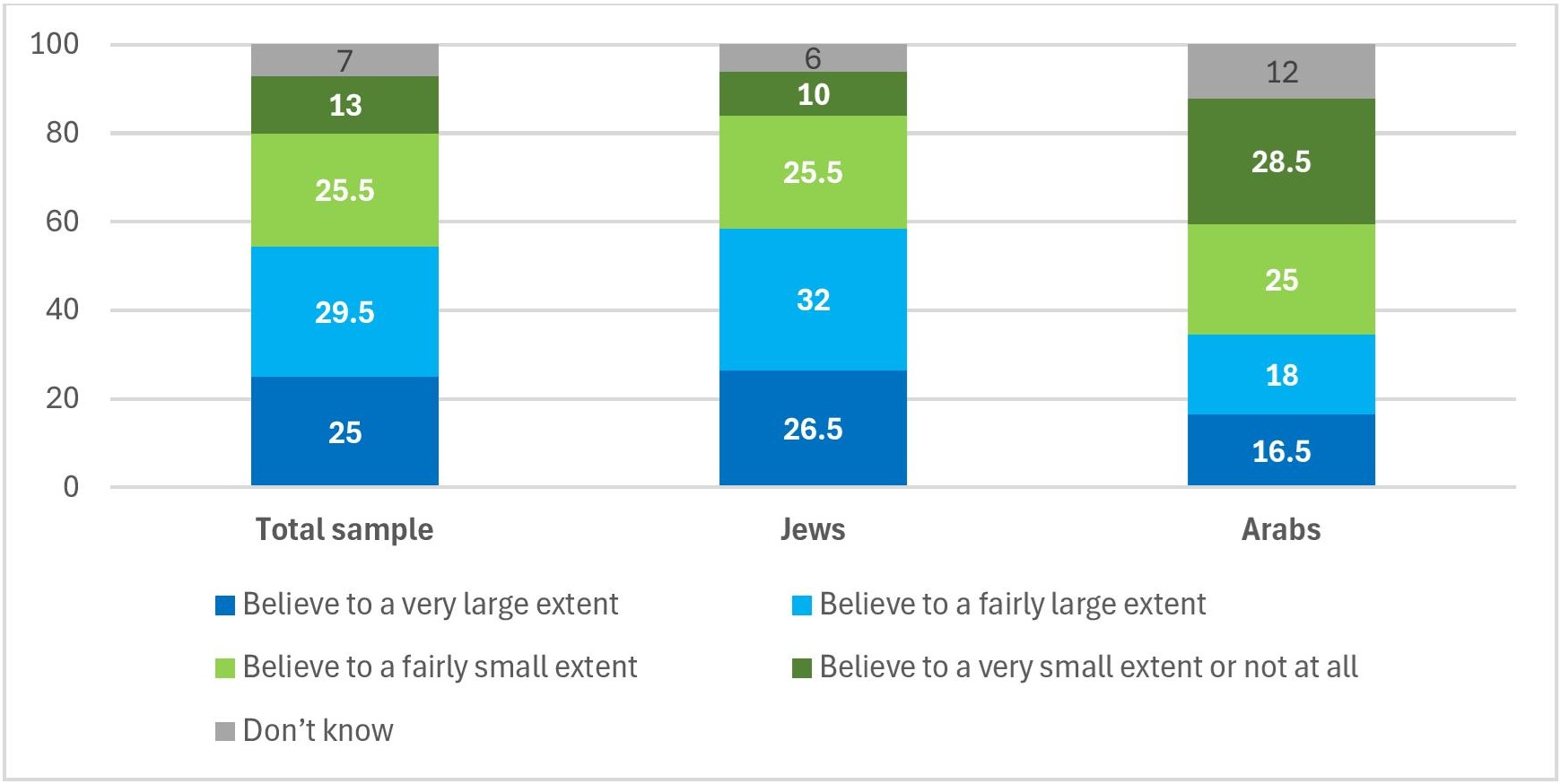
We compared the responses with those to a similar question asked in 2022, and also analyzed the Jewish sample by political orientation. In the total Jewish sample, as well as in all three political camps, we found a sizeable increase in the share of those who believe the IDF’s reporting on this subject. However, the share of those who do not believe the IDF’s reporting has not decreased; instead, the rise in trust has come at the expense of the share of respondents selecting the “don’t know” option, which fell from 19% in 2022 to 6% in 2025.
Believe to a very large or fairly large extent the IDF’s reporting on the number of soldiers committing suicide during their military service (Jews; %)*
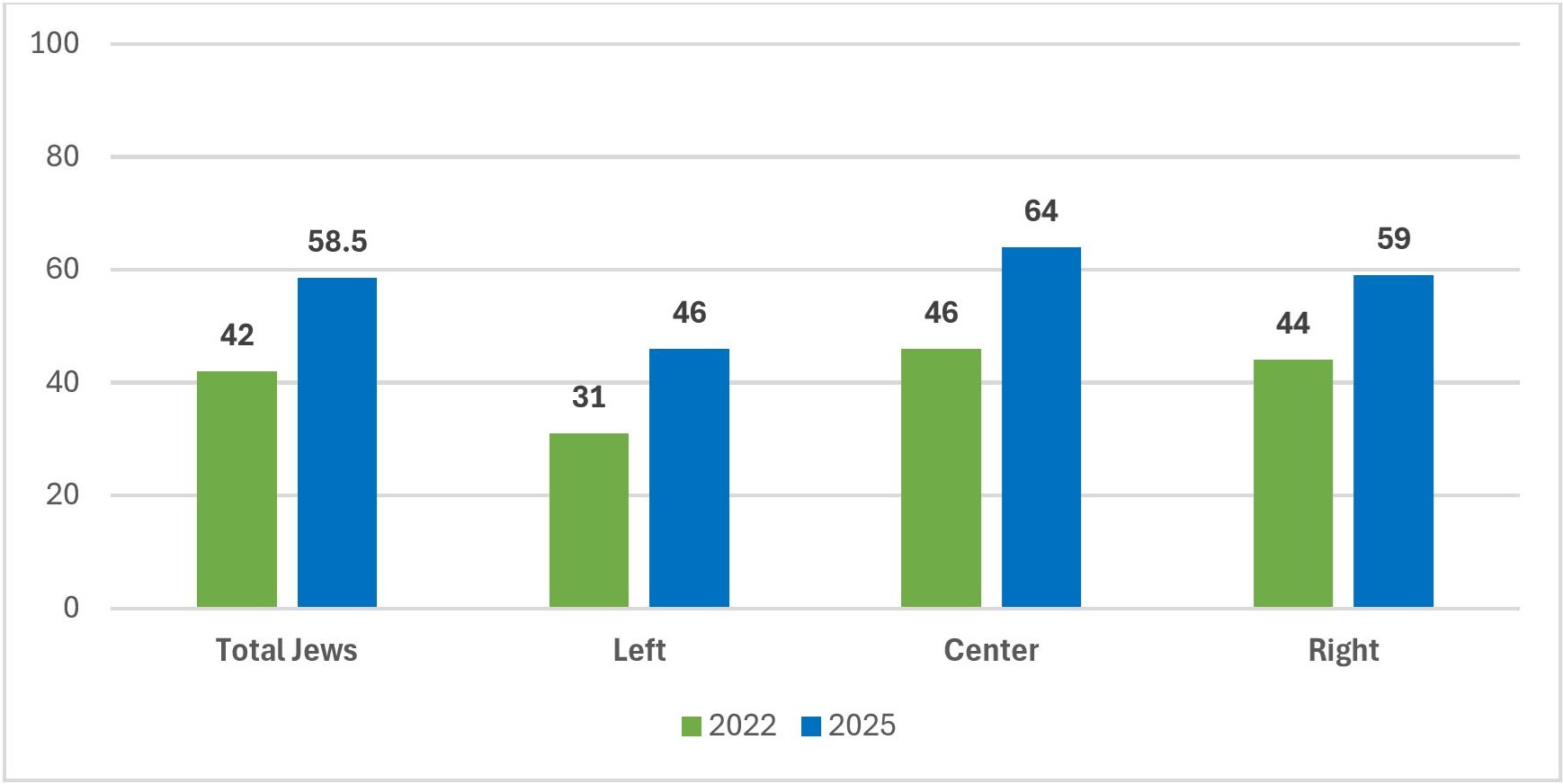
*In 2022, the wording of the question was: How credible do you think the IDF’s reports on the number of suicides are? Very credible; quite credible; not so credible; not at all credible; don’t know. For the purposes of the analysis presented here, we grouped categories 1–2 and categories 3–4.
Violence against the IDF and security forces: Recently, there has been an increase in the number of incidents of violence by groups of settlers against the IDF and security forces in the West Bank / Judea and Samaria. We asked: “In your opinion, are the security forces and enforcement agencies treating these settlers too harshly, too leniently, or appropriately?”
Nearly half of the total public think that the security forces are too lenient toward settler violence, almost a quarter think enforcement is appropriate, and a similar share think the treatment of violent settlers is too harsh.
A clear majority of Arab respondents think that the security forces are too lenient in their treatment of settler violence, while only a small minority thinks they are too harsh. Among Jews, too, the largest share—though not a majority—think that the agencies are too lenient, and about a quarter that they are too harsh.
Are the security forces and enforcement agencies treating groups of settlers involved in incidents of violence against the IDF and security forces too harshly, too leniently, or appropriately? (%)
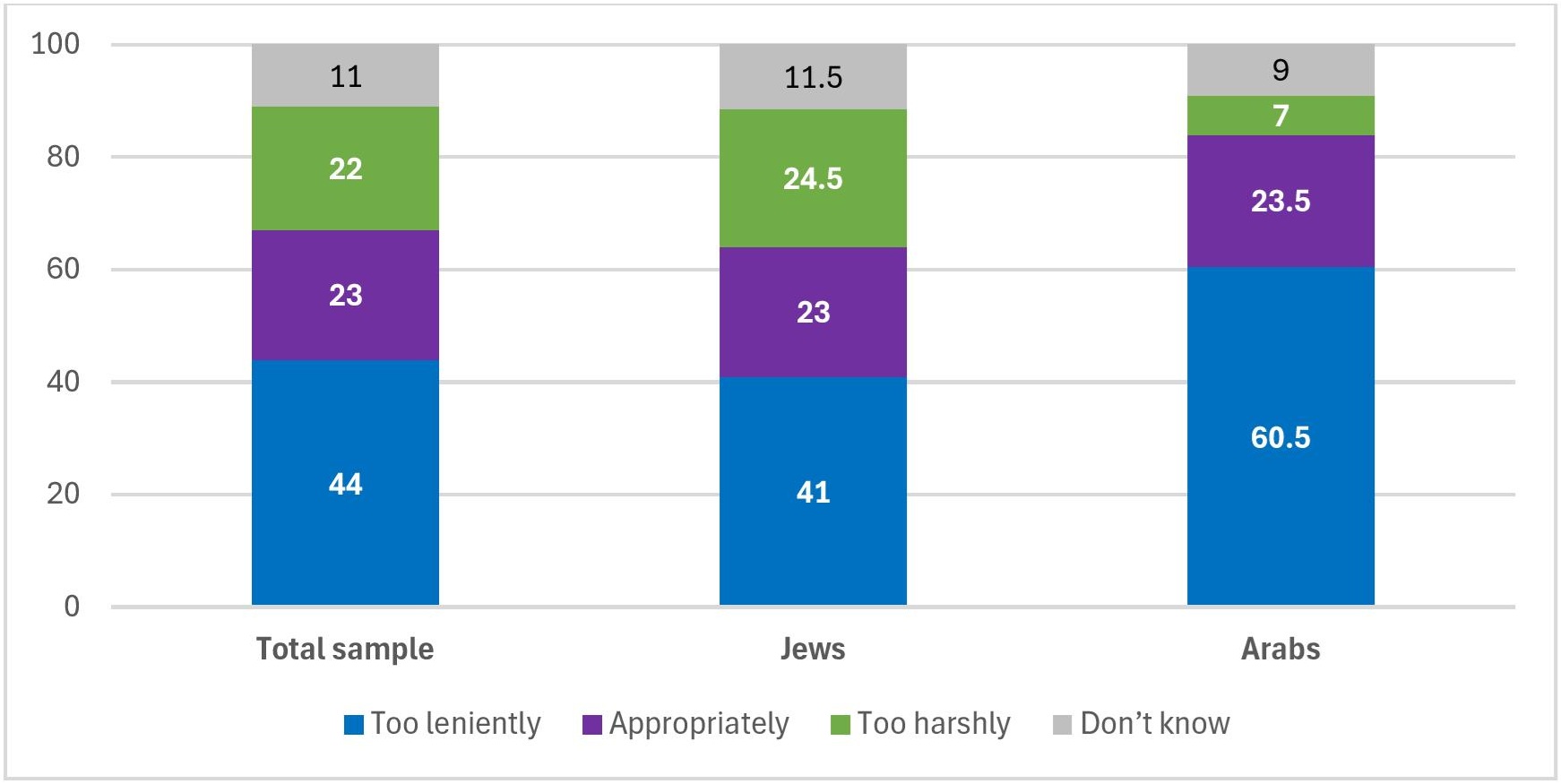
Breaking down the Jewish sample by religiosity reveals that the share of respondents who believe that the security forces are responding too harshly toward settler violence decreases as the level of religious conservatism declines. Thus, among the Haredim, a majority of about two-thirds think that the security forces and enforcement agencies are treating these incidents too harshly, while the picture is reversed among secular respondents, of whom around two-thirds think that these agencies are acting too leniently. The rest of the groups are somewhere in between.
Are the security forces and enforcement agencies treating groups of settlers involved in incidents of violence against the IDF and security forces too harshly, too leniently, or appropriately? (Jews, by religiosity; %)
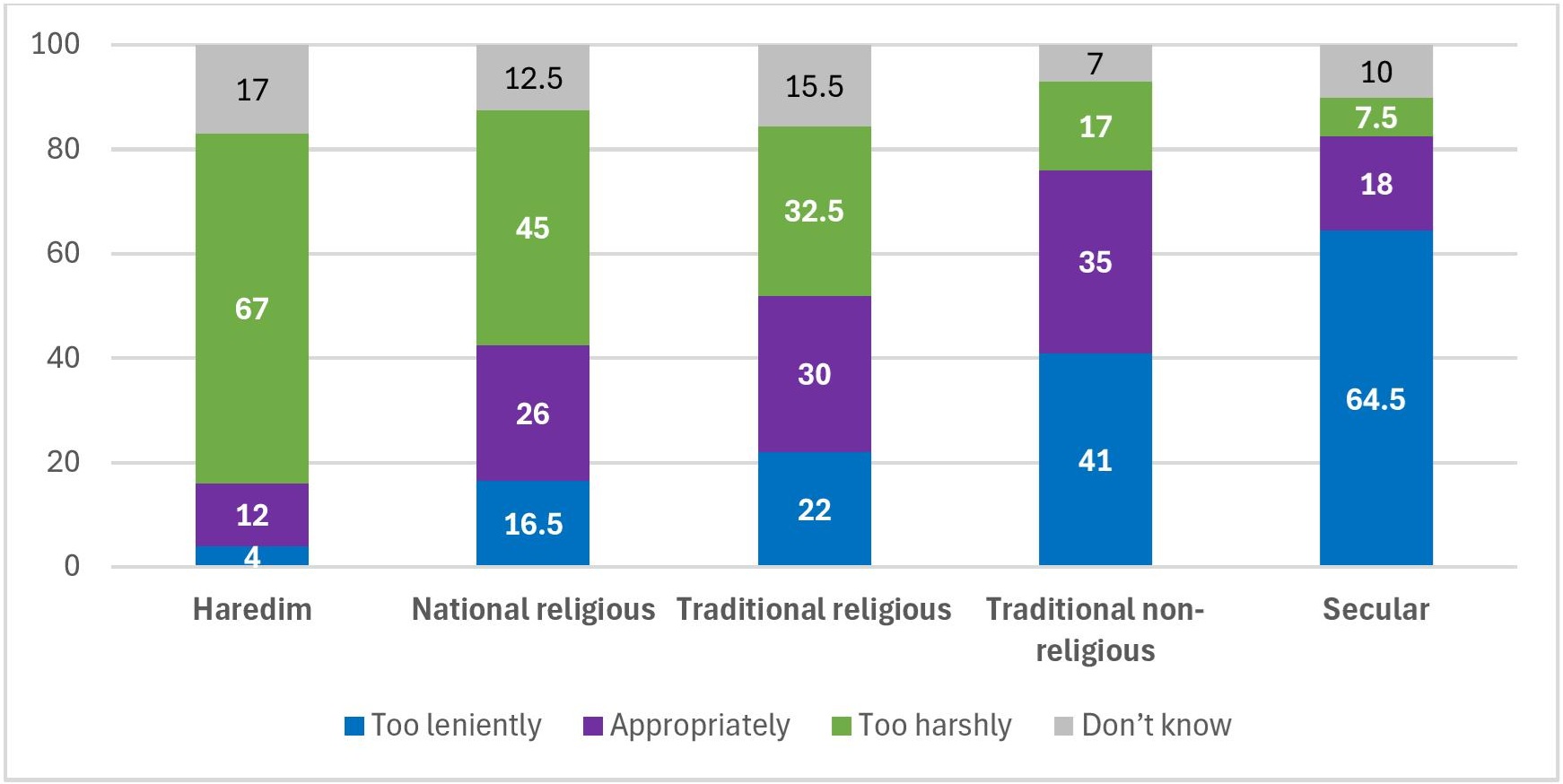
Breaking down the responses by political orientation (Jews) reveals that in the Center, and even more so on the Left, most of the respondents think that the agencies are acting too leniently (59% and 82% respectively), while only a minority think they are acting too harshly—Center, 8%; Left, 5% (acting appropriately: Center, 23%; Left, 9%). On the Right, the distribution is different, with the largest share saying that the response is too harsh (34.5%), 27% that it is too lenient, and 26% that it is appropriate.
A breakdown by vote in the 2022 elections produces an interesting finding: Among voters for the coalition parties, there is a significant difference between voters for the Haredi parties and Religious Zionism– of whom some two-thirds think that the agencies are acting too harshly—and Likud voters, of whom only the smallest share hold the same opinion. As expected, among voters for all opposition parties, the majority think that the security forces and enforcement agencies are acting too leniently.
Are the security forces and enforcement agencies treating groups of settlers involved in incidents of violence against the IDF and security forces too harshly, too leniently, or appropriately? (total sample, by vote in 2022 elections; %)
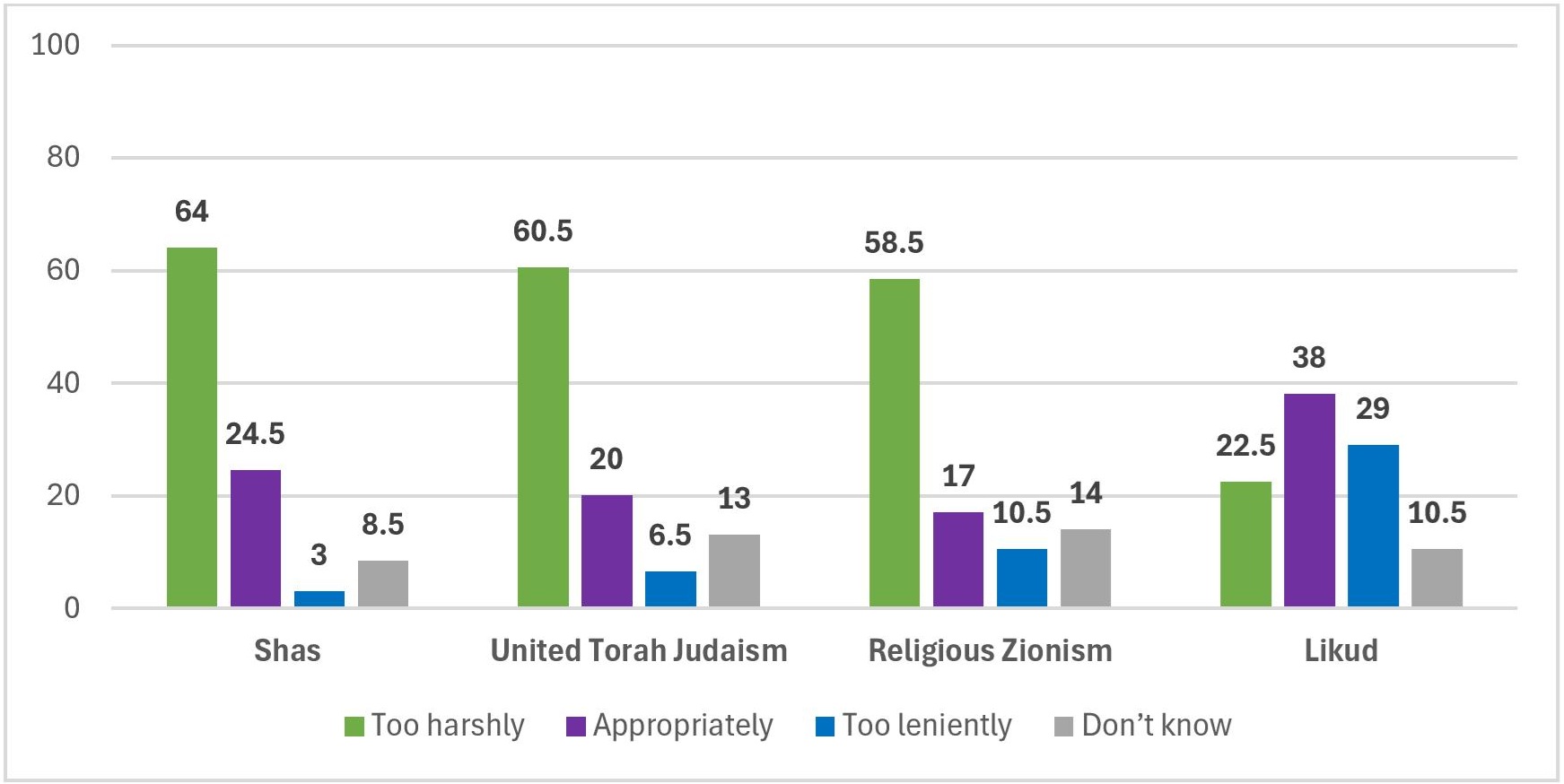
Violence toward Palestinians in the West Bank / Judea and Samaria: We asked a similar question regarding the treatment by the security forces and enforcement agencies of violent acts by settlers against Palestinians. The results are strikingly similar to the previous question: Here, too, the largest share (42%) of the general public think that the agencies are too lenient, while around a quarter think that they are too harsh, and another quarter think that their response is appropriate.
Among Jews, the distribution is very similar to the distribution in the general sample, while among Arabs, the share of respondents who think that these agencies are acting too leniently is significantly larger.
Are the security forces and enforcement agencies treating groups of settlers involved in acts of violence against Palestinians too harshly, too leniently, or appropriately? (%)
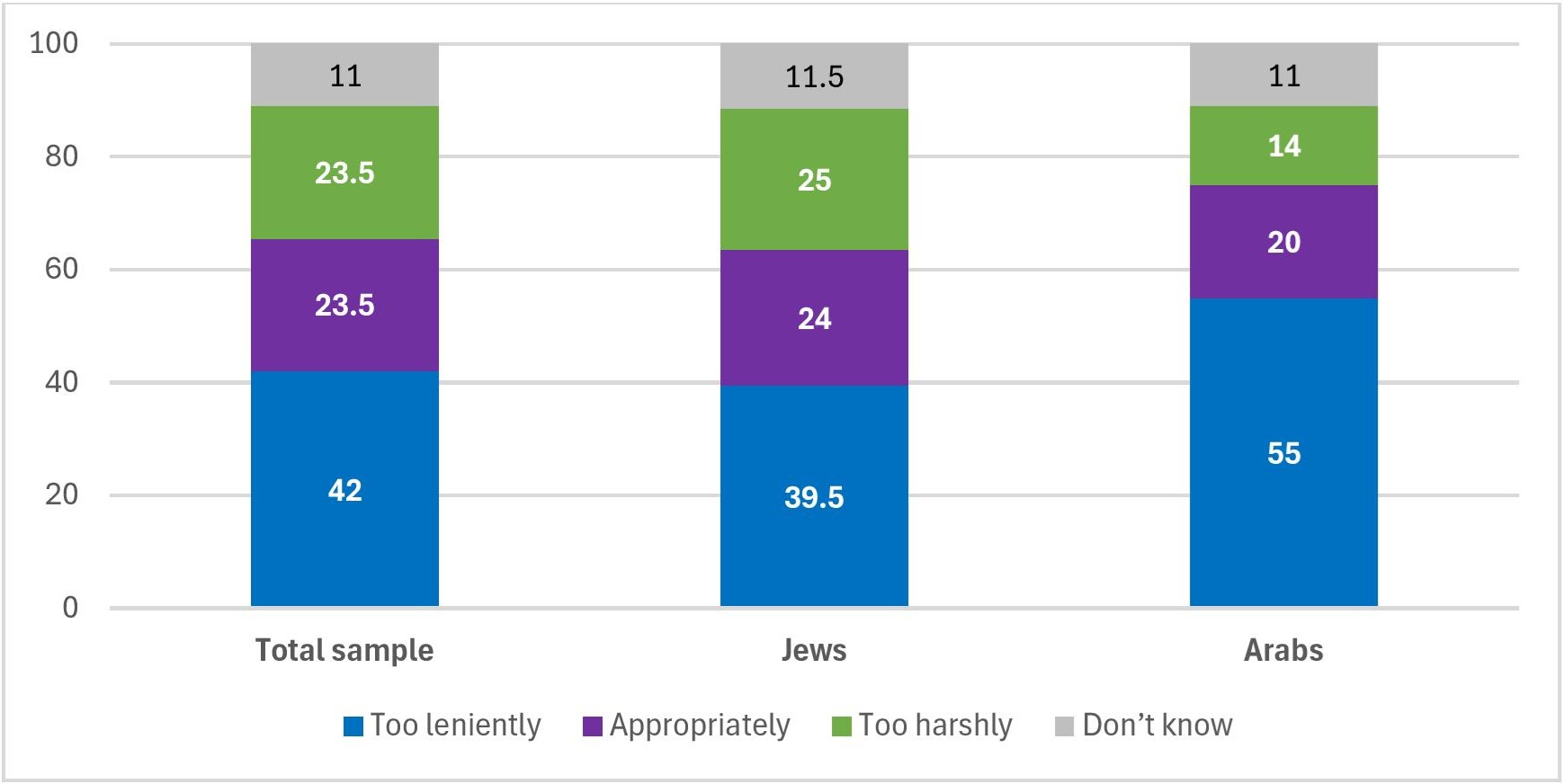
Breaking down responses in the Jewish sample by political orientation, we again found a large majority on the Left and a smaller majority in the Center who think that the enforcement agencies and security forces are acting too leniently. On the Right, meanwhile, the largest share thinks they are acting too harshly.
A breakdown by religiosity once again places the Haredim and the secular at the extremes: Half of the Haredim think that the enforcement agencies’ response is too harsh, while a slightly larger share of secular respondents think it is too lenient. The remaining groups are somewhere in between. It is worth noting a difference within the Haredi group: The proportion of those who view the response against settlers who attack the IDF as too harsh (67%) is significantly larger than the proportion of those who think the response against settlers who attack Palestinians is too harsh (50%).
We cross-tabulated the two questions—about the response of the security forces and enforcement agencies to settler violence against IDF forces and to settler violence against Palestinians—and found a high level of overlap between the responses: 73.5% of those who think that the security forces’ response is too harsh regarding violence against IDF forces also think that their response is too harsh regarding violence against Palestinians. A similar share (75.5%) of those who think that the security forces are too lenient in their handling of attacks on IDF forces think the same way about the handling of violence against Palestinians. (There is an overlap of 68% among respondents who think the forces’ response is appropriate).
We wanted to examine the public’s views regarding the Israeli military response in support of the Druze in Syria (we enlarged the Druze sample so that we could examine their views separately).
Intervention as a required obligation as part of the “covenant of blood”? Just over half of the Jews consider the scale of Israel’s military response to have been appropriate, about a quarter think it was too small, and only 7% think it was too large. Among the Druze, nearly half think that the response was appropriate in scale (similar to the Jewish response), over a quarter that it was too small, and a similar proportion think it was too large. It is surprising that among the (non-Druze) Arabs, the largest share—about a third of the respondents—think that that Israel’s military response was too small, while 19% think it was too large. Also noteworthy is the fact that around a quarter of the Arab respondents selected the “don’t know” option, which could indicate a reluctance to express a clear position on the issue.
In the context of its “covenant of blood” with the Druze community in Israel, Israel has promised to defend the Druze in Syria. Was the Israeli response in Syria to attacks on the Druze there too large, too small, or appropriate? (%)
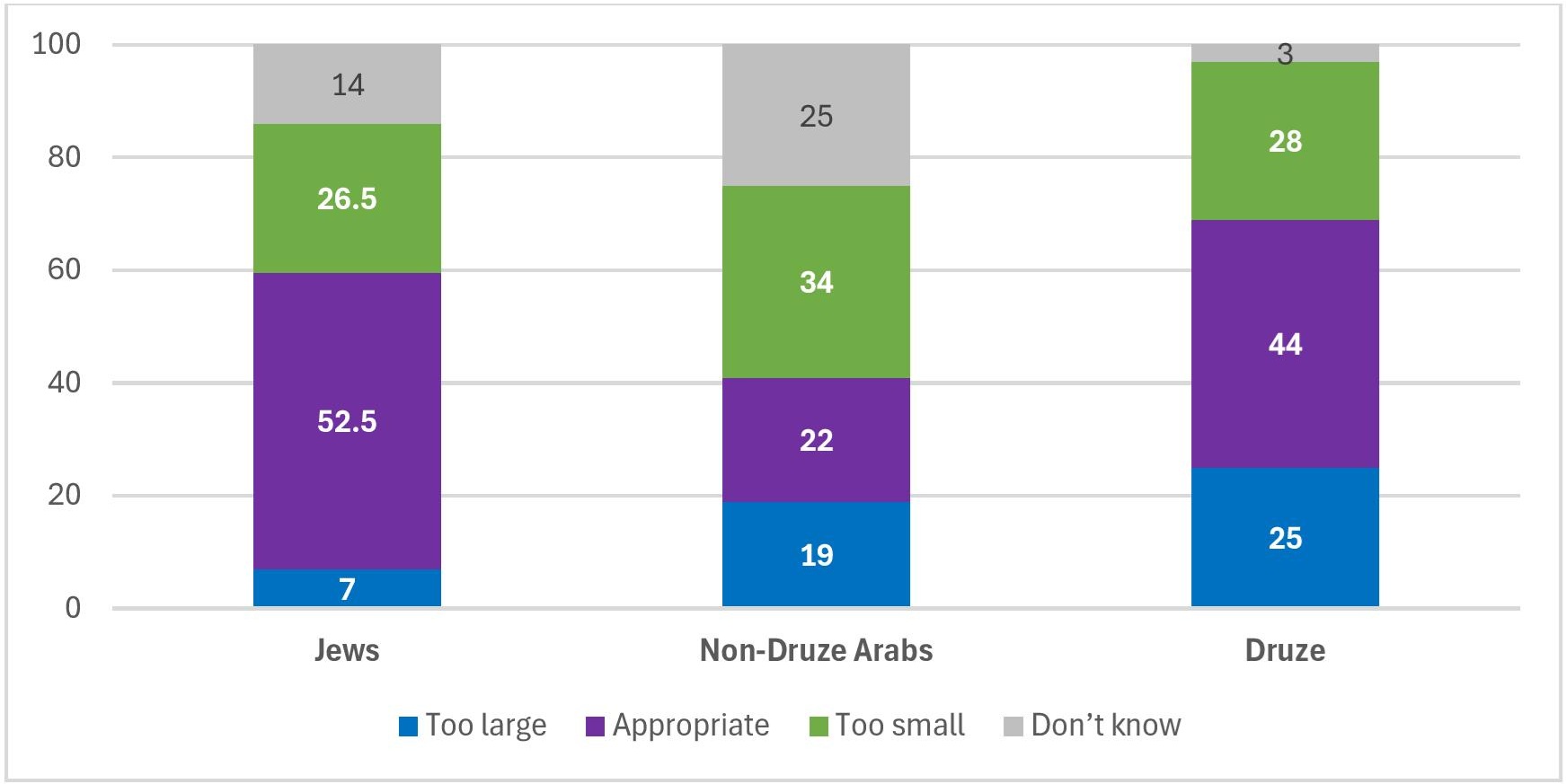
A breakdown by political orientation (Jews) reveals that in all three camps, the largest share of respondents think the Israeli response was appropriate (Right, 56%; Center, 49%; and Left, 43%). On the other hand, only a small minority in each camp think the response was too large: Center, 9%; Left, 7%; and Right, 6%. On the Right, around a quarter (24%) think the response was too small. This is also the view of 21% on the Left and 36% in the Center. It worth noting that a very large share of those on the Left (29%) selected the “don’t know” response, which could indicate a dilemma between commitment to the Druze and opposition to military operations.
Intervention on behalf of the Druze against the backdrop of talks between Israel and Syria: In this regard, we found a great similarity between the Jews and the Druze: in both groups, a large majority of around three-quarters think that the military response was correct even against the background of the talks, which could have been negatively affected. Among the non-Druze Arabs, more than half think that the response was not correct in light of the progress in talks with Syria.
Recent media reports claimed that there had been progress in talks between Israel and Syria. Against this backdrop, do you think that Israel’s military response in Syria was correct or not correct? (%)
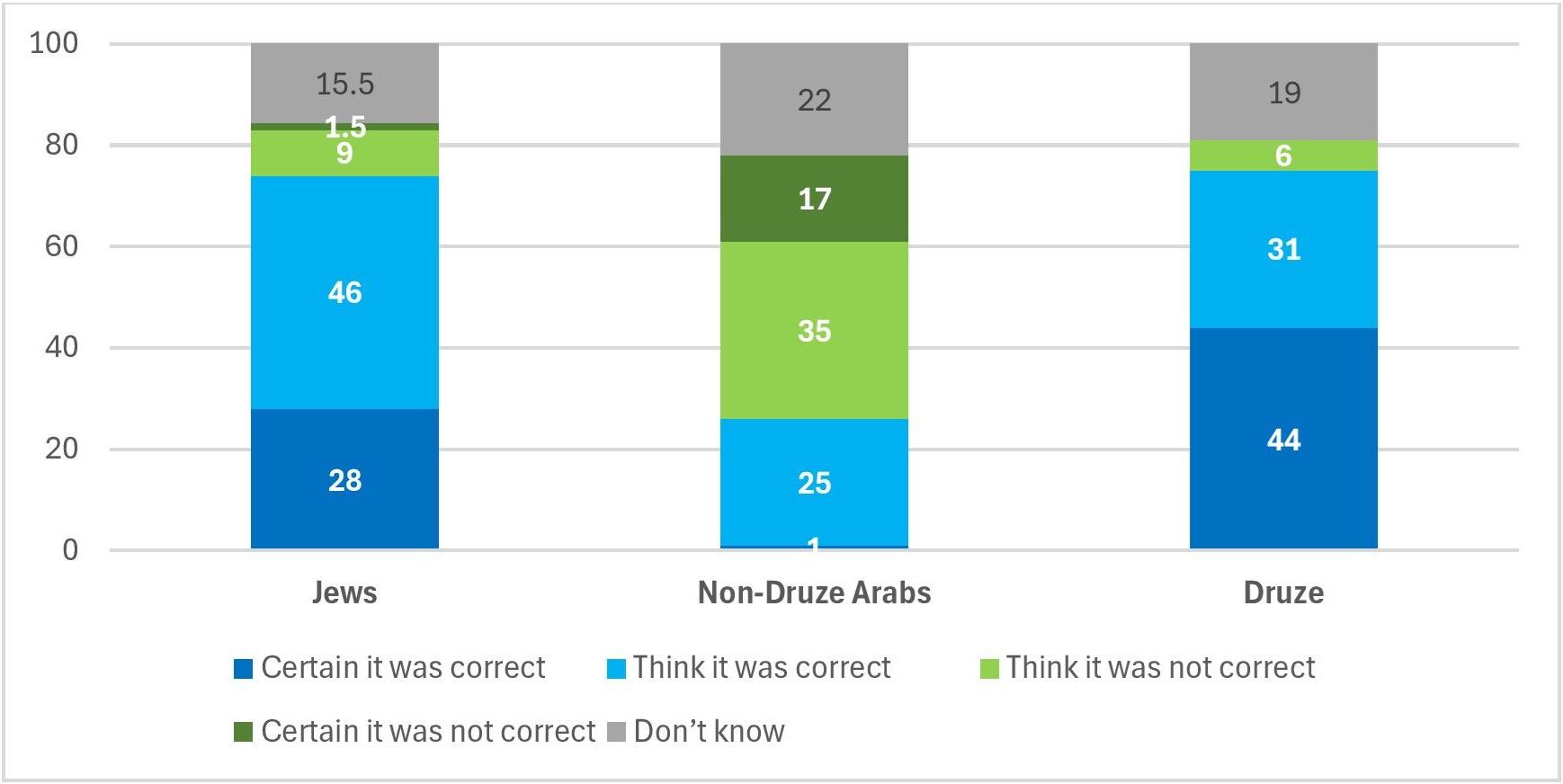
A breakdown of the Jewish sample by political orientation reveals a large majority in the Center (70%), and even larger on the Right (80%), who think that the military response was correct. There is also a majority on the Left who think that the military response was correct, albeit smaller (54.5%).
We asked: “Are the many reports of rising antisemitism and attacks on Israelis abroad affecting or not affecting your decisions about traveling abroad in the near future?” More than half of all respondents said that the increase in antisemitism is affecting their plans: 38% reported an impact on the choice of destination, and another 18% said they would not travel abroad in the near future because of these reports. Around a quarter (24%) reported that they had not planned to travel abroad in the near future in any case, while 17% are planning to travel abroad as usual.
Among Jews, 42% report that the rise in such incidents is affecting their choice of destination, and 17% say that as a result, they will not travel abroad anytime soon. Among Arabs, around a quarter say that they will not travel abroad in the near future due to these incidents, while 17.5% say that they are affecting their choice of travel destination.
When we look only at those who intended to travel abroad and leave out those who did not plan to travel anyway, the percentage of Jews who report that these incidents are affecting their travel plans jumps to 76% (affecting their travel destination, 54.5%; will not travel at all, 21.5%), while among Arabs it reaches 65% (affecting their travel destination, 26.5%; will not travel at all, 38.5%).
Breaking down responses in the Jewish sample by religiosity reveals that in all groups, between one-third and one-half of respondents report an impact on their travel destination, and between 12.5% and 24.5% do not plan to travel due to the rise in antisemitism and harassment of Israelis. Removing from the equation those who did not plan to travel anyway causes these shares to increase sharply: 84% of the traditional religious, 81% of the traditional non-religious, 78% of the national religious, and 72% of the secular and Haredi publics report that these incidents are affecting their decision—whether influencing their choice of destination, or persuading them not to travel at all.
Are the many reports of rising antisemitism and harassment of Israelis abroad affecting or not affecting your decisions about traveling abroad in the near future? (%)
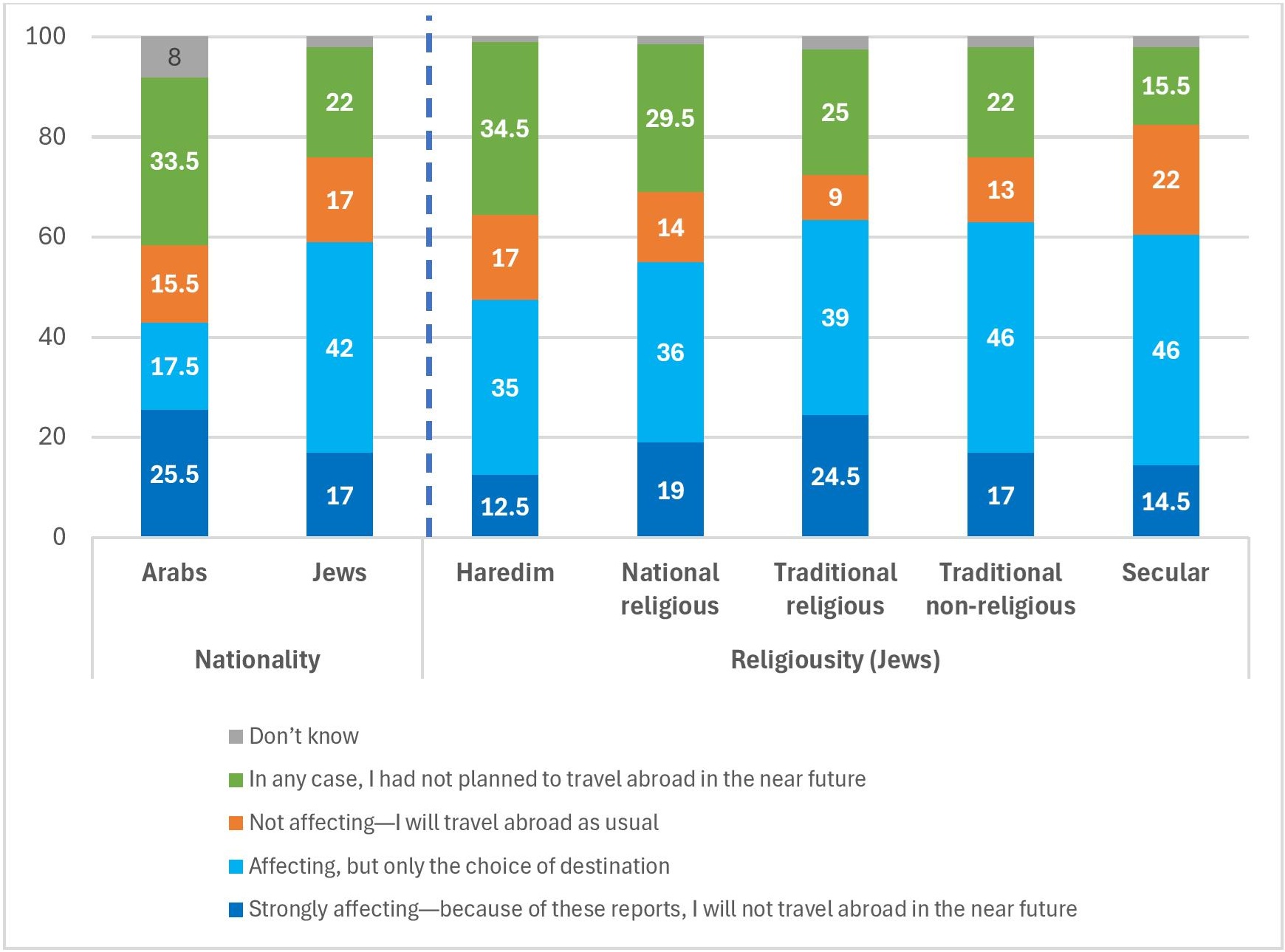
The July 2025 Israeli Voice Index was prepared by the Viterbi Family Center for Public Opinion and Policy Research at the Israel Democracy Institute. The survey was conducted via the internet and by telephone (to include groups that are under-represented on the internet) between July 27–31, 2025, with 601 men and women interviewed in Hebrew and 152 in Arabic, constituting a nationally representative sample of the adult population in Israel aged 18 and over. The maximum sampling error was ±3.57% at a confidence level of 95%. Field work was carried out by Shiluv I2R. The full data file can be found at: https://dataisrael.idi.org.il.
